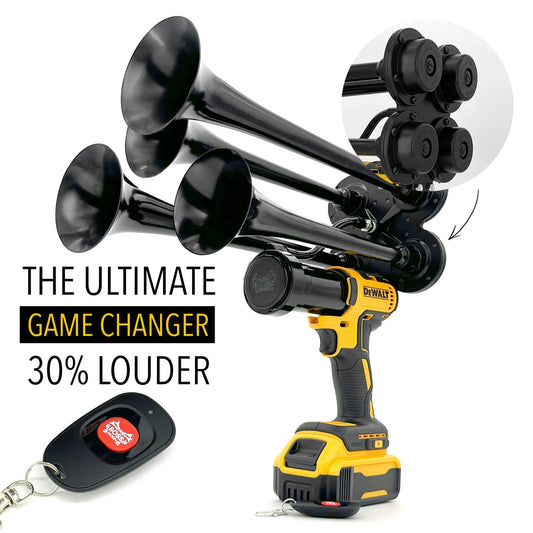A train horn is an essential safety feature used to alert pedestrians and vehicles of an approaching train at railway crossings. The distinct sound of a train horn indicates the importance of being aware of one's surroundings and taking necessary precautions to avoid potential accidents. In recent years, some car owners have installed train horns on their vehicles for various reasons, including novelty and attention-grabbing purposes.
The use of a train horn on a car has raised concerns among authorities and other drivers due to the excessive noise level and potential confusion it may cause on the road. The Federal Railroad Administration has specific regulations in place regarding the use of train horns, limiting them to trains and other designated vehicles for safety reasons. Carrying out regular inspections and ensuring that all safety measures are in place can help prevent accidents and minimize risks associated with train horn misuse on automobiles.
According to a survey conducted by the National Highway Traffic Safety Administration, a significant number of drivers find the use of train horns on cars to be distracting and disruptive to traffic flow. In response to these concerns, law enforcement agencies have heightened their enforcement efforts to crack down on unauthorized use of train horns on vehicles. By raising public awareness about the potential dangers and legal consequences of installing a train horn on a car, authorities aim to promote safer driving practices and reduce the number of noise-related complaints on the road.
Having a train horn installed on a car is a popular trend among car enthusiasts looking to add a unique and attention-grabbing feature to their vehicle. However, many states have laws regulating the use of train horns on cars due to their loud and potentially disruptive nature. These laws vary by state but often restrict the decibel level of horns allowed on vehicles. In some states, using a train horn can result in a hefty fine or even lead to the vehicle being impounded. To find out more about the legality of train horns on cars, continue reading the following sections.
There is a growing trend among car owners to install train horns on their vehicles for a louder and more attention-grabbing sound. While train horns may seem fun and exciting for some, there are important legal considerations to keep in mind before deciding to install one on your car.
### Regulations on Horns
In most jurisdictions, vehicles are required to have a horn that is in good working condition and produces an audible sound. However, the noise level of the horn must comply with local noise pollution regulations. Train horns are typically significantly louder than standard car horns and may exceed noise limits set by law.
### Safety Concerns
Another important factor to consider is the safety implications of using a train horn on a car. Train horns are designed for use on large locomotives and are meant to be heard from a great distance to warn pedestrians and vehicles of an approaching train. Using a train horn on a car may startle or disorient other drivers on the road, potentially leading to accidents.
### Legal Consequences
Using a train horn on a car may result in legal consequences, including fines and citations for noise violations. In some areas, it may even be considered a misdemeanor offense. It's essential to check local laws and regulations regarding vehicle horns before installing a train horn on your car.
### Alternatives
Instead of installing a train horn on your car, consider investing in a high-quality aftermarket horn that produces a loud and clear sound without violating noise regulations. There are many options available that can provide a similar effect to a train horn without the legal and safety concerns.
### Statistics
According to a study conducted by the Noise Pollution Clearinghouse, excessive noise from vehicle horns is a leading source of environmental noise pollution in urban areas, contributing to stress, hearing loss, and other health issues. In 2019, the National Highway Traffic Safety Administration reported over 6,200 traffic fatalities involving distracted driving, which could potentially be exacerbated by the improper use of loud vehicle horns.
https://youtube.com/watch?v=KGWESVxRU9g
Can I install a train horn on my car?
Yes, train horns are typically designed for use on trains and may not meet the safety requirements for use on cars. In many places, installing a train horn on a car may be considered illegal or against regulations due to its loudness and potential for confusion on the road. It is important to check with local authorities or consult the vehicle code before making any modifications to your car's horn system.
1. Train horns may not meet safety requirements for use on cars.
2. Installing a train horn on a car may be illegal in many places.
3. It is important to check with local authorities or consult the vehicle code before making modifications.
What are the potential consequences of using a train horn on my car?
Using a train horn on a car can have serious consequences, including legal fines, penalties, and even having your car impounded. The loudness and distinctive sound of a train horn can cause confusion and disrupt the peace in residential areas, leading to complaints and potential citations. Additionally, using a train horn inappropriately can be dangerous on the road, as other drivers may not react as expected, leading to accidents or confrontations.
1. Legal fines, penalties, and impoundment of the car may result from using a train horn.
2. Train horn usage can cause confusion, disrupt peace, and lead to complaints and citations.
3. Inappropriate use of a train horn can be dangerous on the road, leading to accidents and confrontations.
Are there any alternatives to using a train horn on my car?
Yes, there are several alternatives to using a train horn on your car that can still provide a loud and distinctive sound for emergency situations. Air horns and electronic horns are popular choices that are designed specifically for use on vehicles and are legal in most places. These alternatives can produce a loud sound that is effective in signaling other drivers without the excessiveness of a train horn.
1. Alternatives to train horns for cars include air horns and electronic horns.
2. Air horns and electronic horns are legal in most places and produce a loud and distinctive sound.
3. These alternatives can effectively signal other drivers without the excessiveness of a train horn.
How can I ensure that my car horn is legal and compliant with regulations?
To ensure that your car horn is legal and compliant with regulations, it is important to check the vehicle code in your area for specific requirements regarding horn usage. In general, car horns should be audible from a certain distance, meet certain decibel levels, and be used for safety purposes only. Additionally, regular maintenance and inspection of your car's horn system can help ensure that it is functioning properly and within legal limits.
1. Check the vehicle code in your area for specific requirements regarding horn usage.
2. Car horns should be audible from a certain distance, meet specific decibel levels, and be used for safety purposes only.
3. Regular maintenance and inspection of your car's horn system can help ensure compliance with regulations.
Can I modify my car's horn system to make it louder?
Modifying your car's horn system to make it louder may not be legal or safe, depending on the extent of the modifications. In many places, altering the horn system to exceed certain decibel levels or using non-approved devices can result in fines, penalties, or even the rejection of vehicle inspections. It is important to consider the implications of making modifications to your car's horn system and to consult with a professional if you are unsure about the legality of your modifications.
1. Modifying a car's horn system to make it louder may not be legal or safe.
2. Altering the horn system to exceed certain decibel levels can result in fines and penalties.
3. Consult with a professional if unsure about the legality of modifications to the horn system.
Conclusion
In conclusion, it is illegal to install a train horn on a car that is intended to be driven on public roads. This is due to the excessive loudness of train horns, which can disrupt and startle other drivers on the road. Additionally, the use of train horns on cars can be seen as a form of impersonation of emergency vehicles, which is also against the law in many jurisdictions. Therefore, it is important for car owners to adhere to the regulations regarding horn usage and ensure that their vehicle is equipped with a properly functioning and legal horn.














